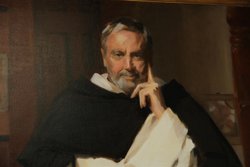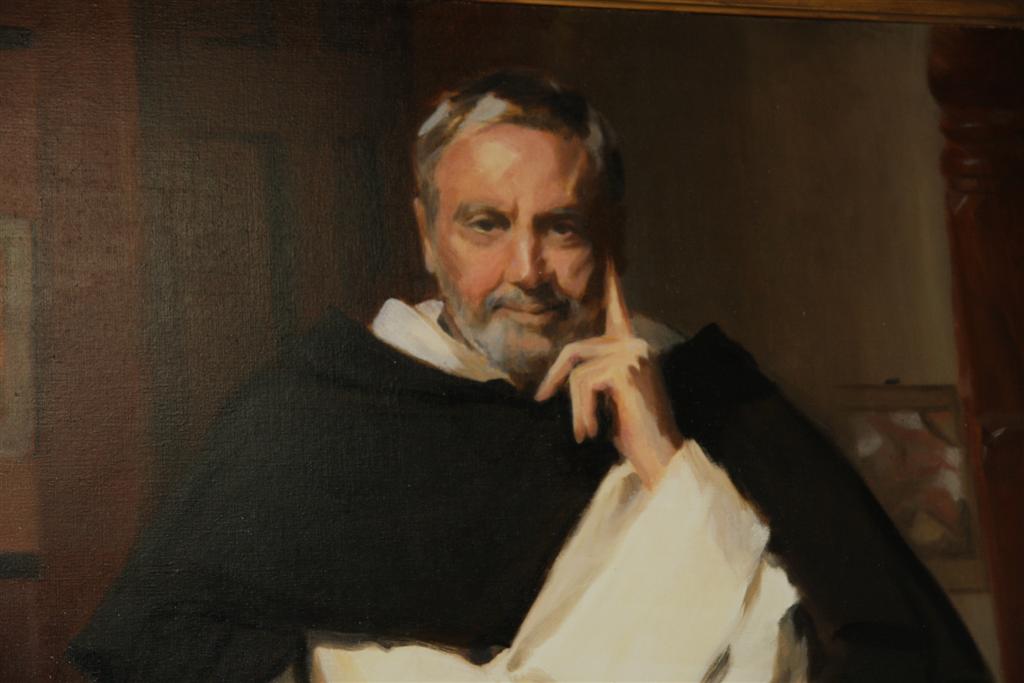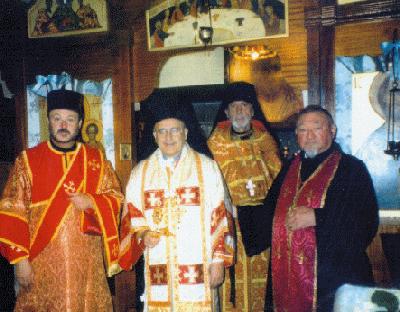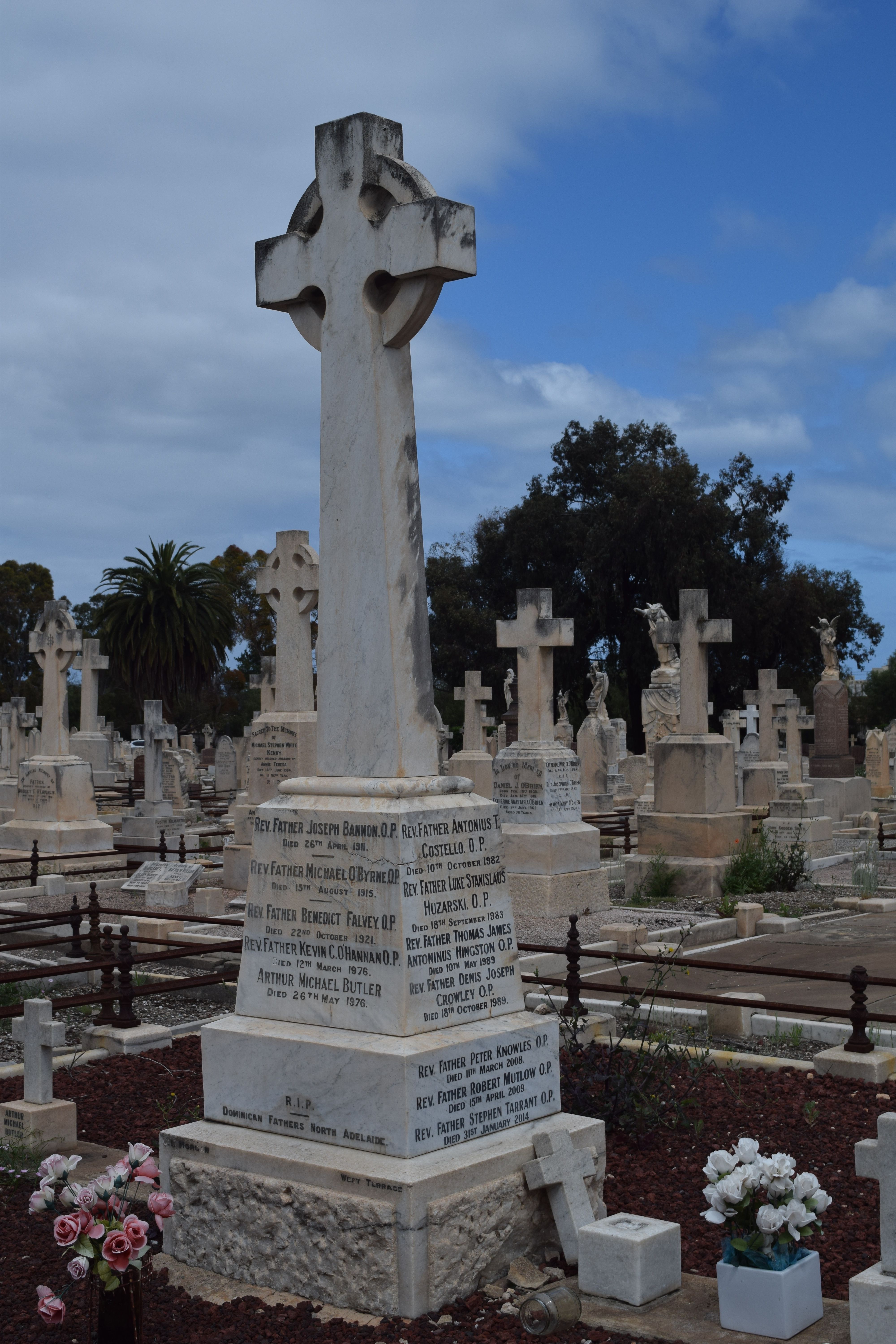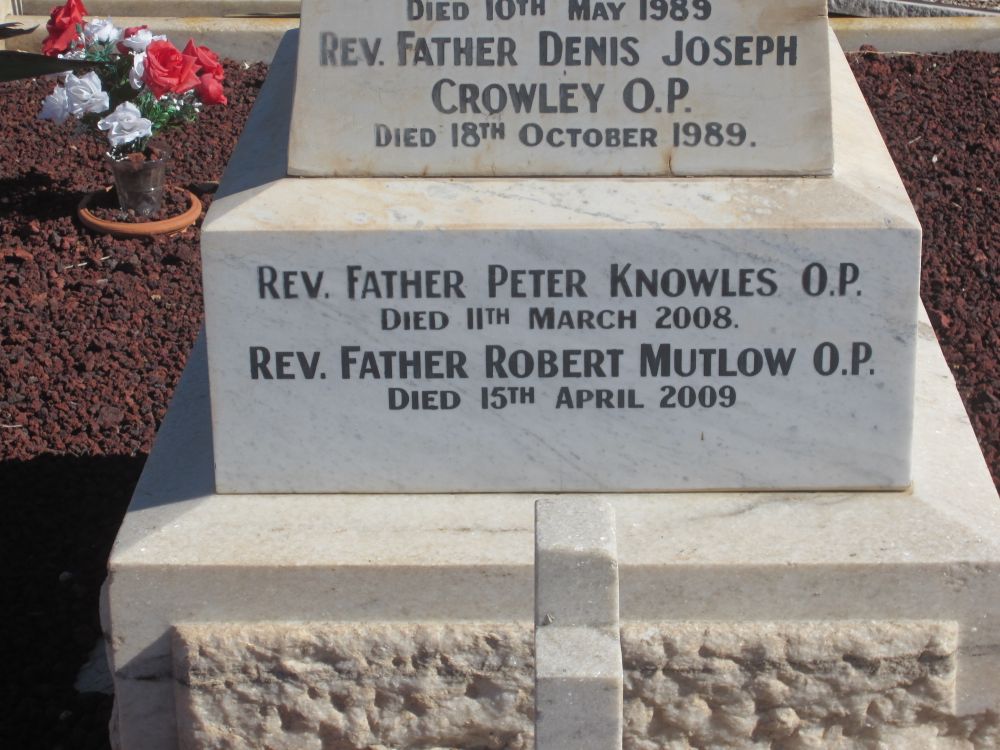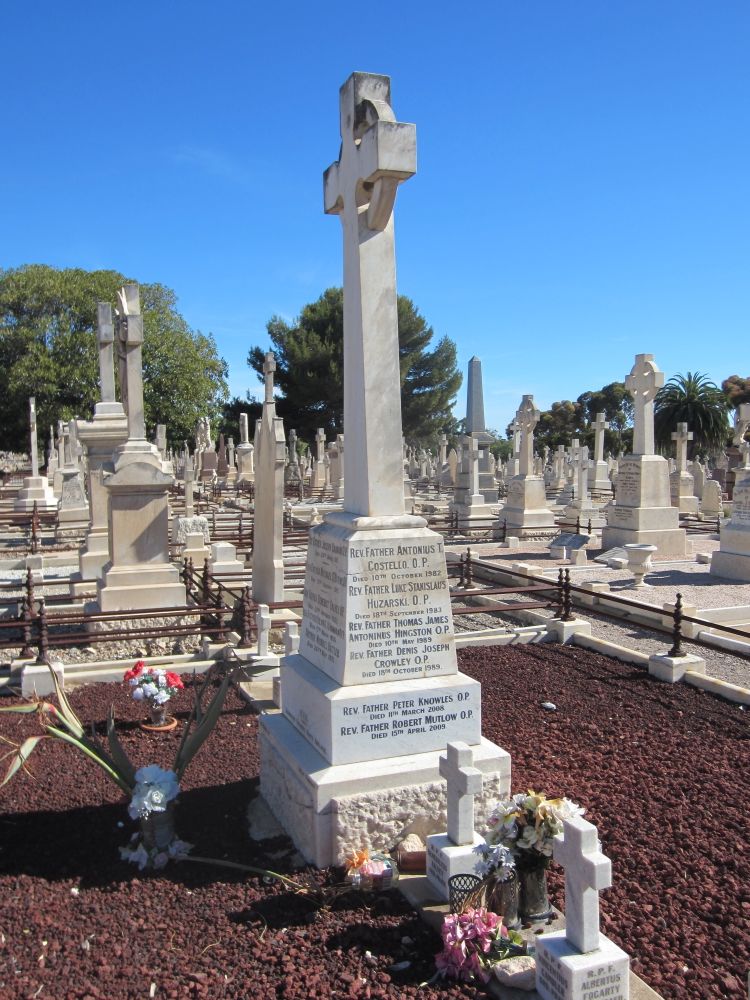The family moved to Melbourne, where his father died in 1931. Peter received the sacrament of confirmation at Our Lady of Victories church, Camberwell, in 1938, and attended the Jesuit Fathers' Xavier College at Kew between 1941 and 1946.
On completing his schooling, he travelled through Europe and America with a keen interest in the monastic way of life. From June 1947, he spend one and a half years at the Cistercian Abbey of Gethsemani, Kentucky, and from February 1949, a similar amount of time at St. Hugh's Priory, the Carthusian Monastery at Parkminster in England.
Not finding his vocation in either place, Peter returned to Australia and spent a brief period working as a jackeroo. Back in Melbourne, while living at Hawthorn, he applied to join the Australian Province of the Dominican Order at the end of 1950, and was accepted. He underwent a novitiate at St Dominic's Priory, East Camberwell, and was professed on February 27, 1952. He had been given the religious name of Henry but reverted to his given name later in life. He carried out his ecclesiastical studies at St. Dominic's and then at the Order's Theology House in Sydney, Holy Name Priory at Wahroonga. He was ordained to the priesthood on December 18, 1956.
Soon after ordination he was sent to New Zealand as chaplain to the Catholic Teachers Training College in Auckland. He resided with the Dominican Community in the suburb of Remuera. He also taught theology and philosophy to religious' sisters in spiritual formation and professional training as teachers.
In the early 1960's he returned to Australia and became chaplain at the University of New England and the Teachers' College at Armidale, northern New South Wales. In 1964, he moved again but retained the same kind of apostolate when he was appointed as the first full-time Catholic Chaplain at Melbourne's recently-established second university, Monash University, located in the south-eastern suburb of Clayton. Initially based at St Dominic's Priory, he later took up residence privately in Clayton and moved again to Mannix College when it was opened in 1969. The College was a residential facility affiliated with the University, established by the Archdiocese of Melbourne and managed by Dominican Friars.
Father Peter's connection with Monash University lasted for a quarter of a century. He was much respected by academic and administrative staff and was approached for advice by vice-chancellors, heads of faculties and others. He was drawn to young people. Perplexed and troubled undergraduates benefited from his kindness, compassion, generosity and encouragement, as well as his spiritual wisdom, intellectual guidance and wide-ranging personal culture. Today a considerable number of people speak of the profound influence that Father Peter had on their development as young adults, some testifying that their lives were turned around. He had a gift for warm friendship, assisted by a lively affability, the enjoyment of the good things of life, the love of literature and history and a wry sense of humour.
As a schoolboy, Peter had become interested in all things Russian and in the 1960's he gravitated towards the spirituality, theology and liturgy of Eastern Christianity. He was asked to become assistant chaplain to Melbourne's Russian Catholic community who worshipped according to the Byzantine Rite. He mastered several ancient and modern eastern languages, in addition to the modern western European languages that he already possessed. He wrote several articles for scholarly journals and popular magazines and was much in demand as a speaker. In the 1970's Father Peter served on the Provincial Council of the Australasian Dominicans and the Monash University Religious Centre Advisory Committee. He also functioned as acting master of Mannix College in the mid-1970's when the master, Dr. Laurence Fitzgerald, was absent overseas for a sabbatical year in Canada. Later in the same decade he also served as acting dean of the dollege. Hence he was well positioned in terms of administrative experience when he was appointed Master in 1981.
During Father Peter's nine-year term of office as head, Mannix College enjoyed consistently high occupancy levels. The 1980's saw a reform of the college constitution to reflect changes over the previous 20 years and a consolidation of the structures of student leadership and the tutorial programme to enhance the provision of pastoral care and academic assistance. As Master, Peter strongly encouraged the cultural and intellectual aspects of college life. The annual John Henry Newman Lecture was inaugurated. He supported the foundation of the Mannix College Cultural Society and its programme of chamber music, poetry reading and dramatics. The students' annual magazine, The Gryphon, was launched during Peter's period in office as was the Mannix College Dramatic Society which each year presented a theatrical performance. The college conference of the St. Vincent de Paul Society was re-established, with the accent on refugee re-settlement. Father Peter set a high priority on forging close relations with Monash University through regular faculty night dinners held at the college and inviting members of the University to participate in the college's intellectual and cultural life. In view of his interests in eastern Europe he maintained excellent contacts with the Department of Slavonic Languages.
In the period from the 1960's to the 1980's Father Peter made several trips to Russia, Poland, Czechoslovakia, Yugoslavia,Greece, Bulgaria, Romania and other eastern Europe countries to study the life of the church there, especially in countries burdened by Communist repression. He often used his own resources to assist materially members of an harassed and impoverished underground clergy. At the conclusion of one such tour, he reported to the Vatican's Secretariat for Promoting Christian Unity on the state of Christianity in the Soviet Union. In mid-89 he attended a conference on the Russian apostolate organised by the Pontifical Russian College in Rome.
Father Peter completed his term as head of Mannix College at the end of 1989. He hoped to be able to devote more of his time to the study of the oriental churches and, to that end, commenced a sabbatical year at the International Russian Institute, Rome, where he was already well known on account of his expert knowledge of the Russian language and eastern Christian culture. Unfortunately, this opportunity was suddenly cut short by a serious deterioration of his health which necessitated his hospitalisation in Italy for a considerable period of time. On his return to Australia and better health, he spent most of the 1990's residing at the Russian Catholic Centre at Kew as an assistant priest. In 2001, he visited the Holy Resurrection Monastery, Newberry Springs, California, founded by a friend and former Australian Dominican, Father Nicholas Zachariadis. The following year he moved into residence at St. Dominic's Priory in Melbourne. It had been arranged for him to live and assist pastorally at the Ukrainian Cathedral in North Melbourne but that plan, too, was brought to an abrupt end when Peter suffered a serious accident. The rest of his life was marked by chronic poor health.
Late in 2002, he was assigned to St Laurence's Priory in his home town of Adelaide where he was given the conventual offices of librarian and chronicler. In 2006, Bishop Peter Stasiuk, Eparch for Ukrainian Catholics in Australia and New Zealand, created him an Archpriest by the conferral of a special cross in recognition of his many years of service to Australian Catholics of the oriental rites. Initially, Peter tried to provide some ministerial assistance to the Ukrainian community in Adelaide but this soon became impossible as his physical well-being declined sharply. He was cared for in his final illness by his Dominican brothers at St. Laurence's, Mrs Carmel Rolevink, the Priory's house keeper, and Mr Andrew Quinlan, a long-standing close friend of Peter's from Monash days.
Father Peter Knowles died in the early hours of March 11, 2008. He was 81. The Funeral liturgy took place on March 14, at St Laurence's church and was celebrated in the Byzantine-rite by Bishop Stasiuk, assisted by ten Dominican and eastern-rite priests. His remains were laid to rest in the Dominican section of the West Terrace Cemetery, Adelaide.
The family moved to Melbourne, where his father died in 1931. Peter received the sacrament of confirmation at Our Lady of Victories church, Camberwell, in 1938, and attended the Jesuit Fathers' Xavier College at Kew between 1941 and 1946.
On completing his schooling, he travelled through Europe and America with a keen interest in the monastic way of life. From June 1947, he spend one and a half years at the Cistercian Abbey of Gethsemani, Kentucky, and from February 1949, a similar amount of time at St. Hugh's Priory, the Carthusian Monastery at Parkminster in England.
Not finding his vocation in either place, Peter returned to Australia and spent a brief period working as a jackeroo. Back in Melbourne, while living at Hawthorn, he applied to join the Australian Province of the Dominican Order at the end of 1950, and was accepted. He underwent a novitiate at St Dominic's Priory, East Camberwell, and was professed on February 27, 1952. He had been given the religious name of Henry but reverted to his given name later in life. He carried out his ecclesiastical studies at St. Dominic's and then at the Order's Theology House in Sydney, Holy Name Priory at Wahroonga. He was ordained to the priesthood on December 18, 1956.
Soon after ordination he was sent to New Zealand as chaplain to the Catholic Teachers Training College in Auckland. He resided with the Dominican Community in the suburb of Remuera. He also taught theology and philosophy to religious' sisters in spiritual formation and professional training as teachers.
In the early 1960's he returned to Australia and became chaplain at the University of New England and the Teachers' College at Armidale, northern New South Wales. In 1964, he moved again but retained the same kind of apostolate when he was appointed as the first full-time Catholic Chaplain at Melbourne's recently-established second university, Monash University, located in the south-eastern suburb of Clayton. Initially based at St Dominic's Priory, he later took up residence privately in Clayton and moved again to Mannix College when it was opened in 1969. The College was a residential facility affiliated with the University, established by the Archdiocese of Melbourne and managed by Dominican Friars.
Father Peter's connection with Monash University lasted for a quarter of a century. He was much respected by academic and administrative staff and was approached for advice by vice-chancellors, heads of faculties and others. He was drawn to young people. Perplexed and troubled undergraduates benefited from his kindness, compassion, generosity and encouragement, as well as his spiritual wisdom, intellectual guidance and wide-ranging personal culture. Today a considerable number of people speak of the profound influence that Father Peter had on their development as young adults, some testifying that their lives were turned around. He had a gift for warm friendship, assisted by a lively affability, the enjoyment of the good things of life, the love of literature and history and a wry sense of humour.
As a schoolboy, Peter had become interested in all things Russian and in the 1960's he gravitated towards the spirituality, theology and liturgy of Eastern Christianity. He was asked to become assistant chaplain to Melbourne's Russian Catholic community who worshipped according to the Byzantine Rite. He mastered several ancient and modern eastern languages, in addition to the modern western European languages that he already possessed. He wrote several articles for scholarly journals and popular magazines and was much in demand as a speaker. In the 1970's Father Peter served on the Provincial Council of the Australasian Dominicans and the Monash University Religious Centre Advisory Committee. He also functioned as acting master of Mannix College in the mid-1970's when the master, Dr. Laurence Fitzgerald, was absent overseas for a sabbatical year in Canada. Later in the same decade he also served as acting dean of the dollege. Hence he was well positioned in terms of administrative experience when he was appointed Master in 1981.
During Father Peter's nine-year term of office as head, Mannix College enjoyed consistently high occupancy levels. The 1980's saw a reform of the college constitution to reflect changes over the previous 20 years and a consolidation of the structures of student leadership and the tutorial programme to enhance the provision of pastoral care and academic assistance. As Master, Peter strongly encouraged the cultural and intellectual aspects of college life. The annual John Henry Newman Lecture was inaugurated. He supported the foundation of the Mannix College Cultural Society and its programme of chamber music, poetry reading and dramatics. The students' annual magazine, The Gryphon, was launched during Peter's period in office as was the Mannix College Dramatic Society which each year presented a theatrical performance. The college conference of the St. Vincent de Paul Society was re-established, with the accent on refugee re-settlement. Father Peter set a high priority on forging close relations with Monash University through regular faculty night dinners held at the college and inviting members of the University to participate in the college's intellectual and cultural life. In view of his interests in eastern Europe he maintained excellent contacts with the Department of Slavonic Languages.
In the period from the 1960's to the 1980's Father Peter made several trips to Russia, Poland, Czechoslovakia, Yugoslavia,Greece, Bulgaria, Romania and other eastern Europe countries to study the life of the church there, especially in countries burdened by Communist repression. He often used his own resources to assist materially members of an harassed and impoverished underground clergy. At the conclusion of one such tour, he reported to the Vatican's Secretariat for Promoting Christian Unity on the state of Christianity in the Soviet Union. In mid-89 he attended a conference on the Russian apostolate organised by the Pontifical Russian College in Rome.
Father Peter completed his term as head of Mannix College at the end of 1989. He hoped to be able to devote more of his time to the study of the oriental churches and, to that end, commenced a sabbatical year at the International Russian Institute, Rome, where he was already well known on account of his expert knowledge of the Russian language and eastern Christian culture. Unfortunately, this opportunity was suddenly cut short by a serious deterioration of his health which necessitated his hospitalisation in Italy for a considerable period of time. On his return to Australia and better health, he spent most of the 1990's residing at the Russian Catholic Centre at Kew as an assistant priest. In 2001, he visited the Holy Resurrection Monastery, Newberry Springs, California, founded by a friend and former Australian Dominican, Father Nicholas Zachariadis. The following year he moved into residence at St. Dominic's Priory in Melbourne. It had been arranged for him to live and assist pastorally at the Ukrainian Cathedral in North Melbourne but that plan, too, was brought to an abrupt end when Peter suffered a serious accident. The rest of his life was marked by chronic poor health.
Late in 2002, he was assigned to St Laurence's Priory in his home town of Adelaide where he was given the conventual offices of librarian and chronicler. In 2006, Bishop Peter Stasiuk, Eparch for Ukrainian Catholics in Australia and New Zealand, created him an Archpriest by the conferral of a special cross in recognition of his many years of service to Australian Catholics of the oriental rites. Initially, Peter tried to provide some ministerial assistance to the Ukrainian community in Adelaide but this soon became impossible as his physical well-being declined sharply. He was cared for in his final illness by his Dominican brothers at St. Laurence's, Mrs Carmel Rolevink, the Priory's house keeper, and Mr Andrew Quinlan, a long-standing close friend of Peter's from Monash days.
Father Peter Knowles died in the early hours of March 11, 2008. He was 81. The Funeral liturgy took place on March 14, at St Laurence's church and was celebrated in the Byzantine-rite by Bishop Stasiuk, assisted by ten Dominican and eastern-rite priests. His remains were laid to rest in the Dominican section of the West Terrace Cemetery, Adelaide.
Sponsored by Ancestry
Advertisement
Advertisement
